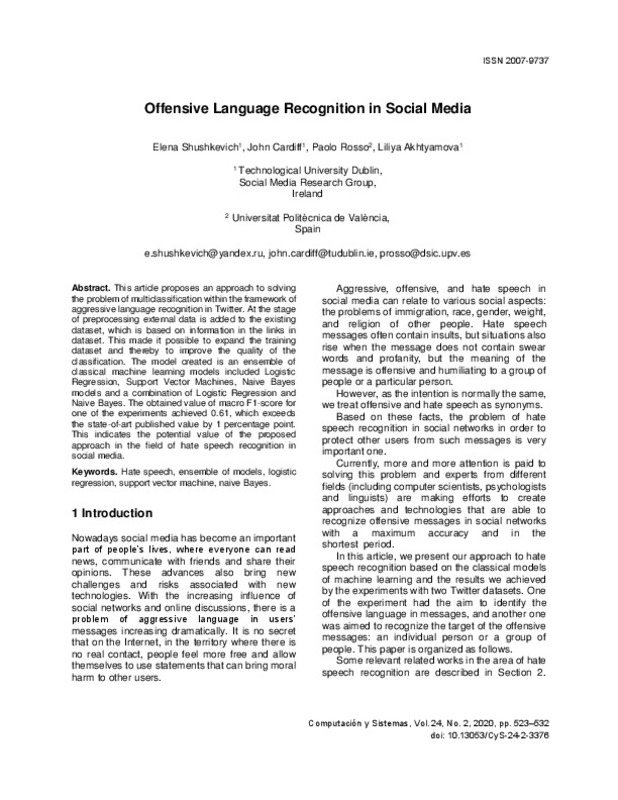JavaScript is disabled for your browser. Some features of this site may not work without it.
Buscar en RiuNet
Listar
Mi cuenta
Estadísticas
Ayuda RiuNet
Admin. UPV
Offensive Language Recognition in Social Media
Mostrar el registro sencillo del ítem
Ficheros en el ítem
| dc.contributor.author | Shushkevich, Elena
|
es_ES |
| dc.contributor.author | Cardiff, John
|
es_ES |
| dc.contributor.author | Rosso, Paolo
|
es_ES |
| dc.contributor.author | Akhtyamova, Liliya
|
es_ES |
| dc.date.accessioned | 2021-05-15T03:30:22Z | |
| dc.date.available | 2021-05-15T03:30:22Z | |
| dc.date.issued | 2020 | es_ES |
| dc.identifier.issn | 1405-5546 | es_ES |
| dc.identifier.uri | http://hdl.handle.net/10251/166394 | |
| dc.description.abstract | [EN] This article proposes an approach to solving the problem of multiclassification within the framework of aggressive language recognition in Twitter. At the stage of preprocessing external data is added to the existing dataset, which is based on information in the links in dataset. This made it possible to expand the training dataset and thereby to improve the quality of the classification. The model created is an ensemble of classical machine learning models included Logistic Regression, Support Vector Machines, Naive Bayes models and a combination of Logistic Regression and Naive Bayes. The obtained value of macro F1-score for one of the experiments achieved 0.61, which exceeds the state-of-art published value by 1 percentage point. This indicates the potential value of the proposed approach in the field of hate speech recognition in social media. | es_ES |
| dc.description.sponsorship | The work of Paolo Rosso was partially funded by the Spanish MICINN under the research project MISMISFAKEnHATE on Misinformation and Miscommunication in social media: FAKE news and HATE speech (PGC2018-096212-B-C31). | es_ES |
| dc.language | Inglés | es_ES |
| dc.publisher | Instituto Politecnico Nacional/Centro de Investigacion en Computacion | es_ES |
| dc.relation.ispartof | Computación y Sistemas | es_ES |
| dc.rights | Reserva de todos los derechos | es_ES |
| dc.subject | Hate speech | es_ES |
| dc.subject | Ensemble of models | es_ES |
| dc.subject | Logistic regression | es_ES |
| dc.subject | Support vector machine | es_ES |
| dc.subject | Naive Bayes | es_ES |
| dc.subject.classification | LENGUAJES Y SISTEMAS INFORMATICOS | es_ES |
| dc.title | Offensive Language Recognition in Social Media | es_ES |
| dc.type | Artículo | es_ES |
| dc.identifier.doi | 10.13053/CyS-24-2-3376 | es_ES |
| dc.relation.projectID | info:eu-repo/grantAgreement/AEI/Plan Estatal de Investigación Científica y Técnica y de Innovación 2017-2020/PGC2018-096212-B-C31/ES/DESINFORMACION Y AGRESIVIDAD EN SOCIAL MEDIA: AGREGANDO INFORMACION Y ANALIZANDO EL LENGUAJE/ | es_ES |
| dc.rights.accessRights | Abierto | es_ES |
| dc.contributor.affiliation | Universitat Politècnica de València. Departamento de Sistemas Informáticos y Computación - Departament de Sistemes Informàtics i Computació | es_ES |
| dc.description.bibliographicCitation | Shushkevich, E.; Cardiff, J.; Rosso, P.; Akhtyamova, L. (2020). Offensive Language Recognition in Social Media. Computación y Sistemas. 24(2):523-532. https://doi.org/10.13053/CyS-24-2-3376 | es_ES |
| dc.description.accrualMethod | S | es_ES |
| dc.relation.publisherversion | https://doi.org/10.13053/CyS-24-2-3376 | es_ES |
| dc.description.upvformatpinicio | 523 | es_ES |
| dc.description.upvformatpfin | 532 | es_ES |
| dc.type.version | info:eu-repo/semantics/publishedVersion | es_ES |
| dc.description.volume | 24 | es_ES |
| dc.description.issue | 2 | es_ES |
| dc.relation.pasarela | S\433850 | es_ES |
| dc.contributor.funder | Agencia Estatal de Investigación | es_ES |








